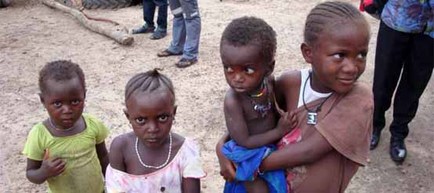Prospects

At the end of the Civil War Sierra Leone was in the middle of an enormous recession. The average citizen survived on the equivalent of a meager 38 US$ cents per day.
Until 2007, Sierra Leone ranked at the bottom of the Human Development Index (HDI) until it surpassed Afghanistan and Niger to rank 186 out of 188 Countries. In the years after the war, considerable progress was made. Economic growth rate reached an average level of 7% before showing a decline to 5.5% in 2008 and 4.5% in 2009 on account of the global world crisis.
Poor infrastructure continued to be a major obstacle to growth. The road network, badly damaged during the war, was still in bad shape, notwithstanding the opening of many new building and refitting yards. Lack of good rural roads was a major bottleneck to growth in agriculture. In 2008, less than 10% of the population had access to electricity and only half had access to safe water.
The adult illiteracy rate was currently around 60% and youth unemployment was about 46%. Moreover, about 60% of the population lived below the poverty level with infant and maternal mortality rates lingering near the bottom of global rankings.
The Government was showing its commitment to combine macro-economic stability and enhanced growth by adopting proper economic policies and implementing structural reforms, through its 'Agenda for Change'. This agenda articulated the Country's development plans and prioritized four strategic areas:
Particular importance was placed on education as a prerequisite for human development and an important catalyst for achieving all targets.
Today, the Ebola epidemic is again devastating the country, and great resources entailing a massive intervention of the international community will be necessary to redress the social and economic situation. However from many sources we receive information that the people, already tried by the past civil war, is facing with courage the present difficulties and is hopeful for the future.
So, as always happens after a big crisis, the Country will hopefully come out of the present Ebola epidemic more mature, more united and, very important, more efficient and organized in its health infrastructures.
Until 2007, Sierra Leone ranked at the bottom of the Human Development Index (HDI) until it surpassed Afghanistan and Niger to rank 186 out of 188 Countries. In the years after the war, considerable progress was made. Economic growth rate reached an average level of 7% before showing a decline to 5.5% in 2008 and 4.5% in 2009 on account of the global world crisis.
Poor infrastructure continued to be a major obstacle to growth. The road network, badly damaged during the war, was still in bad shape, notwithstanding the opening of many new building and refitting yards. Lack of good rural roads was a major bottleneck to growth in agriculture. In 2008, less than 10% of the population had access to electricity and only half had access to safe water.
The adult illiteracy rate was currently around 60% and youth unemployment was about 46%. Moreover, about 60% of the population lived below the poverty level with infant and maternal mortality rates lingering near the bottom of global rankings.
The Government was showing its commitment to combine macro-economic stability and enhanced growth by adopting proper economic policies and implementing structural reforms, through its 'Agenda for Change'. This agenda articulated the Country's development plans and prioritized four strategic areas:
- Electricity
- Transportation network
- Agriculture and fishery
- Sustaining human development, notably health, education and water
Particular importance was placed on education as a prerequisite for human development and an important catalyst for achieving all targets.
Today, the Ebola epidemic is again devastating the country, and great resources entailing a massive intervention of the international community will be necessary to redress the social and economic situation. However from many sources we receive information that the people, already tried by the past civil war, is facing with courage the present difficulties and is hopeful for the future.
So, as always happens after a big crisis, the Country will hopefully come out of the present Ebola epidemic more mature, more united and, very important, more efficient and organized in its health infrastructures.